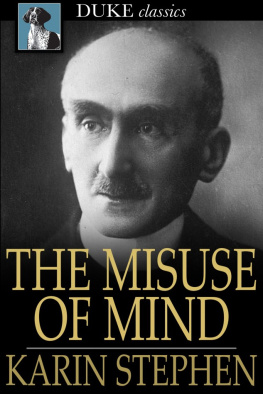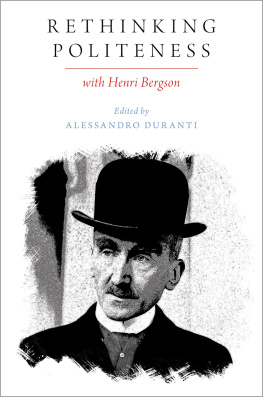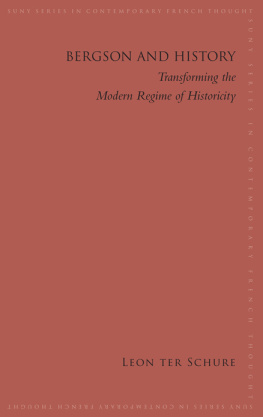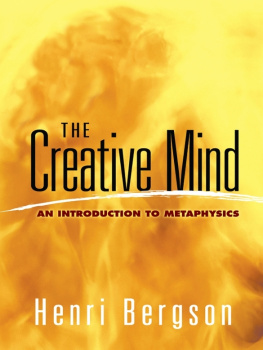THE MISUSE OF MIND
A STUDY OF BERGSON'S ATTACK ON INTELLECTUALISM
* * *
KARIN STEPHEN
*
The Misuse of Mind
A Study of Bergson's Attack on Intellectualism
First published in 1922
ISBN 978-1-63421-250-2
Duke Classics
2014 Duke Classics and its licensors. All rights reserved.
While every effort has been used to ensure the accuracy and reliability of the information contained in this edition, Duke Classics does not assume liability or responsibility for any errors or omissions in this book. Duke Classics does not accept responsibility for loss suffered as a result of reliance upon the accuracy or currency of information contained in this book.
Contents
*
Prefatory Note
*
Being an extract from a letter by Professor Henri Bergson
AYANT lu de prs le travail de Mrs. Stephen je le trouve intressantau plus haut point. C'est une interprtation personelle et originalede l'ensemble de mes vuesinterprtation qui vaut par elle-mme,indpendamment de ce qui j' ai crit. L'auteur s'est assimil l'espritdel doctrine, puis, se dgageant de la matrialit du texte elle advelopp sa manire, dans la direction qu'elle avait choisi, desides qui lui paraissaient fondamentales. Grce la distinctionqu'elle "tablit entre " fact " et " matter, " elle a pu ramener l'unit, et prsenter avec une grande rigueur logique, des vues quej'avais t oblig, en raison de ma mthode de recherche, d'isoler lesunes des autres. Bref, son travail a une grande valeur; il tmoigned'une rare force de pense.
HENRI BERGSON.
Preface
*
THE immense popularity which Bergson's philosophy enjoys is sometimescast up against him, by those who do not agree with him, as areproach. It has been suggested that Bergson's writings are welcomedsimply because they offer a theoretical justification for a tendencywhich is natural in all of us but against which philosophy has alwaysfought, the tendency to throw reason overboard and just let ourselvesgo. Bergson is regarded by rationalists almost as a traitor tophilosophy, or as a Bolshevik inciting the public to overthrow what ithas taken years of painful effort to build up.
It is possible that some people who do not understand this philosophymay use Bergson's name as a cloak for giving up all self-direction andletting themselves go intellectually to pieces, just as hooligans mayuse a time of revolution to plunder in the name of the Red Guard. ButBergson's philosophy is in reality as far from teaching mere lazinessas Communism is from being mere destruction of the old social order.
Bergson attacks the use to which we usually put our minds, but he mostcertainly does not suggest that a philosopher should not use his mindat all; he is to use it for all it is worth, only differently, moreefficiently for the purpose he has in view, the purpose of knowing forits own sake.
There is, of course, a sense in which doing anything in the right wayis simply letting one's self go, for after all it is easier to do athing well than badlyit certainly takes much less effort to producethe same amount of result. So to know in the way which Bergsonrecommends does in a sense come more easily than attempting to get theknowledge we want by inappropriate methods. If this saving of wasteeffort is a fault, then Bergson must plead guilty. But as the field ofknowledge open to us is far too wide for any one mind to explore, thenew method of knowing, though it requires less effort than the old toproduce the same result, does not thereby let us off more easily, forwith a better instrument it becomes possible to work for a greaterresult.
It is not because it affords an excuse for laziness that Bergson'sphilosophy is popular but because it gives expression to a feelingwhich is very widespread at the present time, a distrust of systems,theories, logical constructions, the assumption of premisses and thenthe acceptance of everything that follows logically from them. Thereis a sense of impatience with thought and a thirst for the actual, theconcrete. It is because the whole drift of Bergson's writing is anincitement to throw over abstractions and get back to facts that somany people read him, hoping that he will put into words and find ananswer to the unformulated doubt that haunts them.
It was in this spirit that the writer undertook the study of Bergson.On the first reading he appeared at once too persuasive and too vague,specious and unsatisfying: a closer investigation revealed more andmore a coherent theory of reality and a new and promising method ofinvestigating it. The apparent unsatisfactoriness of the first readingarose from a failure to realize how entirely new and unfamiliar thepoint of view is from which Bergson approaches metaphysicalspeculation. In order to understand Bergson it is necessary to adopthis attitude and that is just the difficulty, for his attitude is theexact reverse of that which has been inculcated in us by thetraditions of our language and education and now comes to usnaturally. This common sense attitude is based on certain assumptionswhich are so familiar that we simply take them for granted withoutexpressly formulating them, and indeed, for the most part, withouteven realizing that we have been making any assumptions at all.
Bergson's principal aim is to direct our attention to the realitywhich he believes we all actually know already, but misinterpret anddisregard because we are biassed by preconceived ideas. To do thisBergson has to offer some description of what this reality is, andthis description will be intelligible only if we are willing and ableto make a profound change in our attitude, to lay aside the oldassumptions which underlie our every day common sense point of viewand adopt, at least for the time being, the assumptions from whichBergson sets out. This book begins with an attempt to give as precisean account as possible of the old assumptions which we must discardand the new ones which we must adopt in order to understand Bergson'sdescription of reality. To make the complete reversal of our ordinarymental habits needed, for understanding what Bergson has to sayrequires a very considerable effort from anyone, but the feat isperhaps most difficult of all for those who have carefully trainedthemselves in habits of rigorous logical criticism. In attempting todescribe what we actually know in the abstract logical terms which arethe only means of intercommunication that human beings possess,Bergson is driven into perpetual self-contradiction, indeed,paradoxical though it may sound, unless he contradicted himself hisdescription could not be a true one. It is easier for the ordinaryreader to pass over the self contradictions, hardly even being awareof them, and grasp the underlying meaning: the trained logician is atonce pulled up by the nonsensical form of the description and themeaning is lost in a welter of conflicting words. This, I think, isthe real reason why some of the most brilliant intellectual thinkershave been able to make nothing of Bergson s philosophy: baffled by theself-contradictions into which he is necessarily driven in the attemptto convey his meaning they have hastily assumed that Bergson had nomeaning to convey.
The object of this book is to set out the relation betweenexplanations and the actual facts which we want to explain and therebyto show exactly why Bergson must use self-contradictory terms if theexplanation of reality which he offers is to be a true one.
Having first shown what attitude Bergson requires us to adopt I havegone on to describe what he thinks this new way of looking at realitywill reveal. This at once involves me in the difficulty with whichBergson wrestles in all his attempts to describe reality, thedifficulty which arises from the fundamental discrepancy between whathe sees the actual fact to be and the abstract notions which are allhe has with which to describe it. I have attempted to show how itcomes about that we are in fact able to perform this apparentlyimpossible feat of describing the indescribable, using Bergson'sdescriptions of sensible perception and the relations of matter andmemory to illustrate my point. If we succeed in ridding ourselves ofour common-sense preconceptions, Bergson tells us that we may expectto know the old facts in a new way, face to face, as it were, insteadof seeing them through a web of our own intellectual interpretations.I have not attempted to offer any proof whether or not Bergson'sdescription of reality is in fact true: having understood the meaningof the description it remains for each of us to decide for himselfwhether or not it fits the facts.












